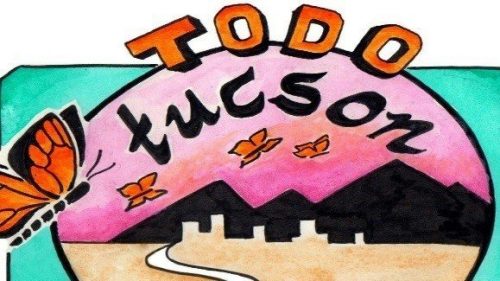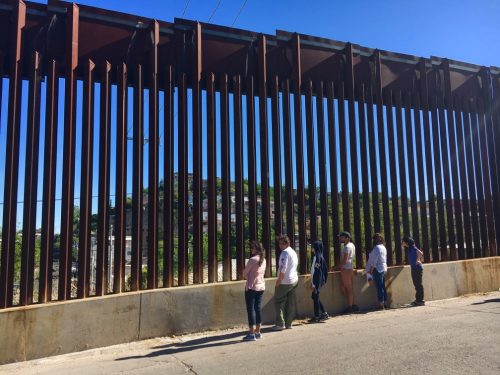
As I reflect on my first month in Tucson, the idea of home seems to be a common thread, weaving itself through my thoughts and experiences.
A New Home
Two weeks ago, we moved out of the dormitories at Borderlinks and into homestays with families in Tucson. Jair and I are staying with our host mom, Maru, and her husband. Maru told us on the first night that her house is the party house, and she was right. We have gotten to know several of her friends over numerous games of cards and dominos, and we have hung out with her children and grandchildren at multiple family functions. On Friday, we got invited to Maru’s birthday dinner at Peter Piper’s Pizza, where we ate our weight in breadsticks and played arcade games with Maru’s grandkids. When there are no kids with monster trucks or game-loving neighbors around, Jair and I relax by watching Fixer Upper marathons on our new favorite TV channel: HGTV.
Maru is no stranger to the issues happening in her community; she herself is an immigrant from Mexico, and she used to answer calls on a hotline for missing and crossing migrants. Just hearing some of the stories she has to tell makes me feel upset, angry, or helpless. But with all that she has witnessed and experienced, Maru always chooses compassion. Whether it be the love and pride she exudes for her family or her desire to make us feel at home in her house, her presence brings joy and comfort to any room she enters.
The tragedies and injustices I am being confronted with often feel like the desert heat: unrelenting and consuming. From Maru, I have learned that while I cannot change the climate, I can change my outlook and lead with kindness and joy.
Feeling at Home

In addition to our internship at the Southside Worker Center, Jair and I got involved in Todo Tucson, a campaign to create a municipal ID program for the city of Tucson. Municipal IDs offer a way for anyone who resides in the city, regardless of financial security or immigration status, to obtain a valid form of identification that is recognized by police. Between undocumented migrants, the homeless, and other disadvantaged populations, campaign organizers believe this type of identification could benefit at least 10% of Tucson residents. Still, putting this type of program in place is proving challenging in Tucson; while there are city council members who support the idea, the city does not want to spend any money to fund the program. The Todo Tucson campaign is currently working on creating a comprehensive, logistically-sound proposal that they can hopefully present to the city council by early fall.
Since we will only be here for another month, our contribution to the campaign is research. We have been creating case studies on other cities that have municipal ID programs and trying to contact organizers from those cities to get advice on how to proceed with our campaign. The campaign can use this information to inform their proposal and prepare for unforeseen roadblocks that arise between ideation and implementation.
Todo Tucson campaign meetings are an incredible example of community organizing in action. Change does not always start from the political elite; in this case, it starts with a dozen people with full-time jobs meeting in a church every Wednesday night. Their resources are limited, but they all dedicate their extra time and energy into creating a resource that will help Tucson’s most targeted populations feel more at home in their city. I feel fortunate to be able to play a tiny role in the campaign and inspired by the selflessness and dedication of those going out of their way to make Tucson a safer, more inclusive place to call home.
Going Home

Before this experience, it never occurred to me that being able to go home is a privilege. I spent the first eighteen years of my life living in the same town, and my parents have lived in the same house since I was one year old. Since I went away to college, I have not been home for more than three weeks at a time. I often complain that home is boring now; I love to see my family and sleep in my own bed, but I get restless after a week and start counting down the days until my next semester or summer trip.
People living in the United States without documentation do not have the luxury of going back to their childhood homes. Many cannot even visit close family members who live across international borders. I have met individuals from Nogales, Sonora who can stand a ten-minute drive from where they grew up, but legislation and a 15-foot fence prevent them from getting any closer. I had been treating visits home like empty spaces between two experiences. Now, I better understand how lucky I am that I can create new memories in the places where I created my first ones.
I am incredibly fortunate that the place I call home has afforded me so many privileges and opportunities. As I begin the second half of my DukeEngage experience, I hope I will continue to challenge myself: How can I use the privileges my home has granted me to contribute to the work being done here, and how can I take what I learn here back to my home?
